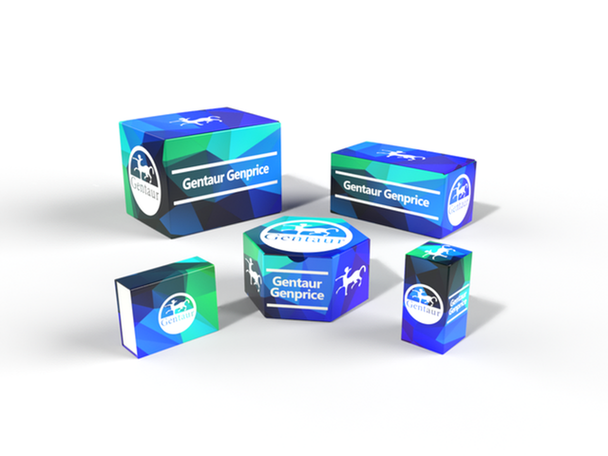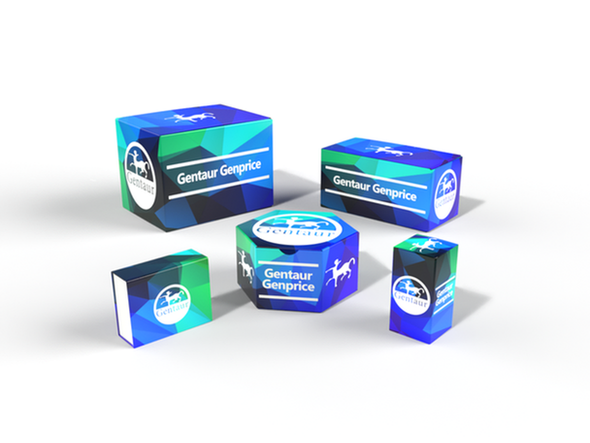Description
IL-33 Antibody | 36-250 | Gentaur UK, US & Europe Distribution
Host: Rabbit
Reactivity: Mouse
Homology: N/A
Immunogen: Recombinant mouse IL-33.
Research Area: Innate Immunity
Tested Application: E, WB
Application: ELISA: (direct and indirect: 1:2, 000-1:5, 000) . Western Blot: (1:2, 000-1:5, 000 using ECL; suggested blocking and dilution buffer is PBST containing 0.05% Tween 20 and 5% skim milk; suggested incubation time is 1 hour at room temperature) . Optimal conditions must be determined individually for each application.
Specificiy: Recognizes mouse IL-33. Detects a band of ~18kDa by Western blot. Does not cross-react with human IL-33.
Positive Control 1: N/A
Positive Control 2: N/A
Positive Control 3: N/A
Positive Control 4: N/A
Positive Control 5: N/A
Positive Control 6: N/A
Molecular Weight: N/A
Validation: N/A
Isoform: N/A
Purification: N/A
Clonality: Polyclonal
Clone: N/A
Isotype: N/A
Conjugate: Unconjugated
Physical State: Liquid
Buffer: Liquid. 0.2um-filtered solution in PBS, pH 7.4. Contains no preservatives.
Concentration: 1 mg/ml
Storage Condition: Stable for at least 6 months after receipt when stored at -20˚C.
Alternate Name: Interleukin-33; IL-1F11; NF-HEV
User Note: Optimal dilutions for each application to be determined by the researcher.
BACKGROUND: Interleukin-33 (IL-33; HF-NEV; IL-1F11) , a member of the IL-1 family of cytokines, is expressed by many cell types following pro-inflammatory stimulation and is thought to be released on cell lysis. The 30kDa human IL33 is converted by CASP1 to a 18kDa protein. IL33 binds to and signals through ST2 (IL1R1) and its stimulation recruits MYD88, IRAK, IRAK4, and TRAF6, followed by phosphorylation of ERK1 (MAPK3) /ERK2 (MAPK1) , p38 (MAPK14) , and JNK. The ability of IL-33 to target numerous immune cell types, like Th2-like cells, mast cells, and B1 cells, and to induce cytokine and chemokine production underlines its potential in influencing the outcome of a wide range of diseases, such as arthritis, asthma, atopic allergy & anaphylaxis, cardiovascular disease/atherosclerosis, nervous system diseases, and sepsis.


![IL-33 Antibody [IL33305B] IL-33 Antibody [IL33305B]](https://cdn11.bigcommerce.com/s-1rdwiq712m/images/stencil/590x590/products/462369/468198/gentaur-genprice__26005.1661610467__29809.1661628092__75433.1661676199__77988.1661684280__64362.1661692443__02085.1662049603__45075.1662119302__91744.1662191540__21580.1662291419__76879.1663495065.png?c=1)
![IL-33 Antibody [IL33305B] IL-33 Antibody [IL33305B]](https://cdn11.bigcommerce.com/s-1rdwiq712m/images/stencil/590x590/products/462190/468019/gentaur-genprice__26005.1661610467__29809.1661628092__75433.1661676199__77988.1661684280__64362.1661692443__02085.1662049603__45075.1662119302__91744.1662191540__21580.1662291419__62645.1663495036.png?c=1)
![IL-33 Antibody [IL33026B] IL-33 Antibody [IL33026B]](https://cdn11.bigcommerce.com/s-1rdwiq712m/images/stencil/590x590/products/462191/468020/gentaur-genprice__26005.1661610467__29809.1661628092__75433.1661676199__77988.1661684280__64362.1661692443__02085.1662049603__45075.1662119302__91744.1662191540__21580.1662291419__35546.1663495036.png?c=1)

